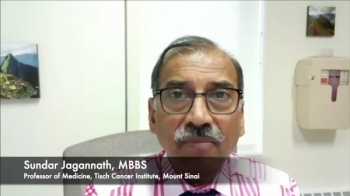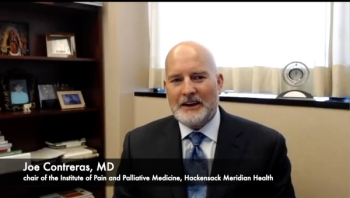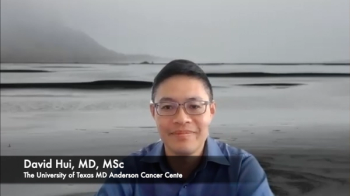
A triplet regimen of tucatinib, trastuzumab, and capecitabine helped patients with HER2-positive metastatic breast cancer and brain metastases live longer with reduced disease progression compared with trastuzumab and capecitabine alone.

A triplet regimen of tucatinib, trastuzumab, and capecitabine helped patients with HER2-positive metastatic breast cancer and brain metastases live longer with reduced disease progression compared with trastuzumab and capecitabine alone.

The use of PARP inhibitor olaparib in conjunction with temozolomide may be an effective treatment for patients with advanced uterine leiomyosarcoma whose tumors harbor a BRCA-like phenotype.

Disease-free survival in liver-only metastatic CRC was significantly improved by introducing adjuvant mFOLFOX6 chemotherapy to hepatectomy

Patricia Jakel, MN, RN, AOCN, reflects on the values of nursing Hackathons and encourages Hackathon participation from oncology nurses.

A novel regimen of relatlimab, an LAG-3 inhibitor, plus nivolumab doubled progression-free survival in patients with untreated, advanced melanoma.

New data support smoking cessation for patients with lung cancer following their diagnosis.

Event co-chair, Syma Iqbal, MD, discusses key points from a recent OncLive® Institutional Perspectives in Cancer webinar, which focused on the evolving landscapes in gastrointestinal cancer.

An expert from Mount Sinai Hospital comments on potential new ruxolitinib combinations to treat patients with myelofibrosis and MPNs.

Patient advocate Jill Feldman led the development of the language guide to help promote patient-centered, stigma-free language across the lung cancer community.

An expert from the Tisch Cancer Institute highlights the importance of medication adherence, nausea management, and proper hydration for patients being treated with selinexor for relapsed or refractory multiple myeloma.

The 3 subscales of burnout—emotional exhaustion, depersonalization, and a low sense of personal accomplishment—may all contribute to an increase in suicidal ideation among American nurses.

The chair of the Institute of Pain and Palliative Care explains how the holistic approach of palliative care makes it a unique treatment modality.

In this episode of “The Vitals,” Nikki Urban, RN, discusses the successful implementation of a phone triage program at Allegheny Health Network.

PI3K-pathway mutations may predict an increased risk of secondary uterine cancer in patients receiving tamoxifen to treat primary breast cancer.

David Hui, MD, MSc, from The University of Texas MD Anderson Cancer Center, discusses findings indicating that patients with agitated delirium may be under-sedated, in accordance with their personalized sedation goal.

Patients with various solid tumor types experienced improved antitumor immunity after adhering to a diet with severe caloric restrictions.

A study conducted by Embracing Carers found that unpaid caregivers experienced negative key changes during the COVID-19 pandemic.

A comparative analysis indicated that lisocabtagene maraleucel generated superior quality of life in patients with relapsed/refractory large B-cell lymphoma compared with the current standard of care.

Kathy Burns, MS, APRN-CNS, AGCNS-BC, of the Arthur G. James Cancer Hospital and Richard J. Solove Research Institute, comments on the importance of self-awareness as an oncology nurse when working to overcome one’s implicit bias.

Updates from the ongoing INSEMA trial suggest that patients with early-stage breast cancer maintain superior quality of life by forgoing sentinel lymph node biopsy and axillary lymph node dissection.

Longer travel times and fewer available resources can make rural cancer care particularly challenging, but oncology nurses may play a crucial role in promoting screenings in these areas.

Bruce Carleton, PharmD, FCP, FISPE, discusses the implications of research findings indicating that very young children are at a higher risk of cisplatin-induced hearing loss.

As minimally invasive surgery for lung cancer increases in popularity, more patients are recovering at home, expanding the need for personalized caregiver education.

An expert discusses the value of enrolling patients with soft tissue sarcoma in histologically specific clinical trials.

Jessica MacIntyre, APRN, NP-C, AOCNP, explains how Hematology/Oncology Nurse Practitioner Fellowship at Sylvester Comprehensive Cancer Center prepares fellows for success.

Patient experience programs can improve quality of care and decrease organization costs, resulting in a more efficient and less expensive cancer care journey for patients.

The chair of the Institute of Pain and Palliative Care explains how patients with cancer may improve their treatment outcomes with palliative care.

Christopher Zorn, clinic operations administrator of Winship Cancer Institute at Emory University, discusses how Winship Cancer Institute fosters a safe, yet festive, holiday environment during the COVID-19 pandemic.

Andrew Kass, MSN, RN, AGNP-C, AOCNP, discusses the impact fatigue can have on patients with cancer and how oncology nurses and APPs can help their patients address this common adverse event.

Medication is the biggest expense for breast, lung, lymphoma, and colorectal cancers.